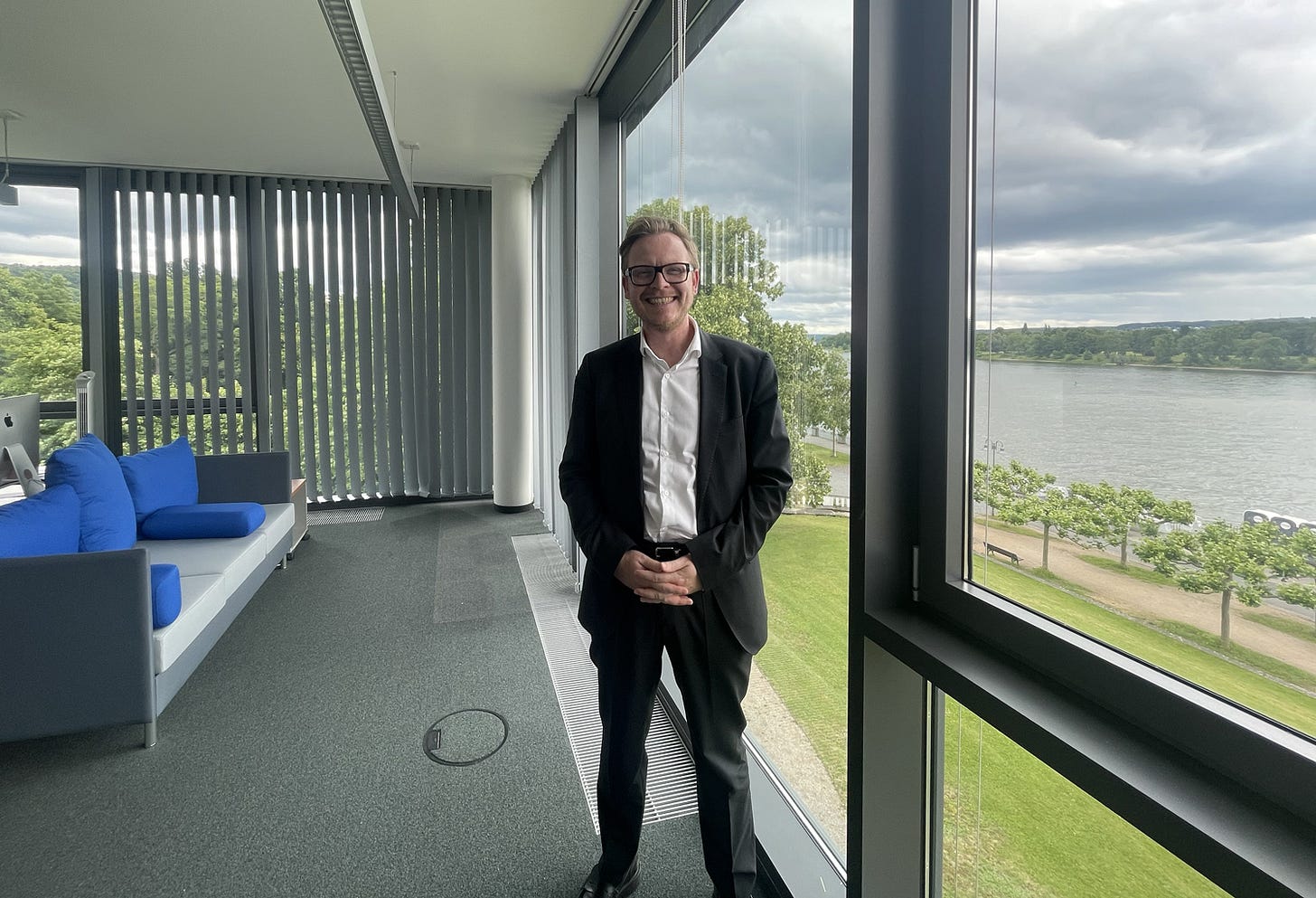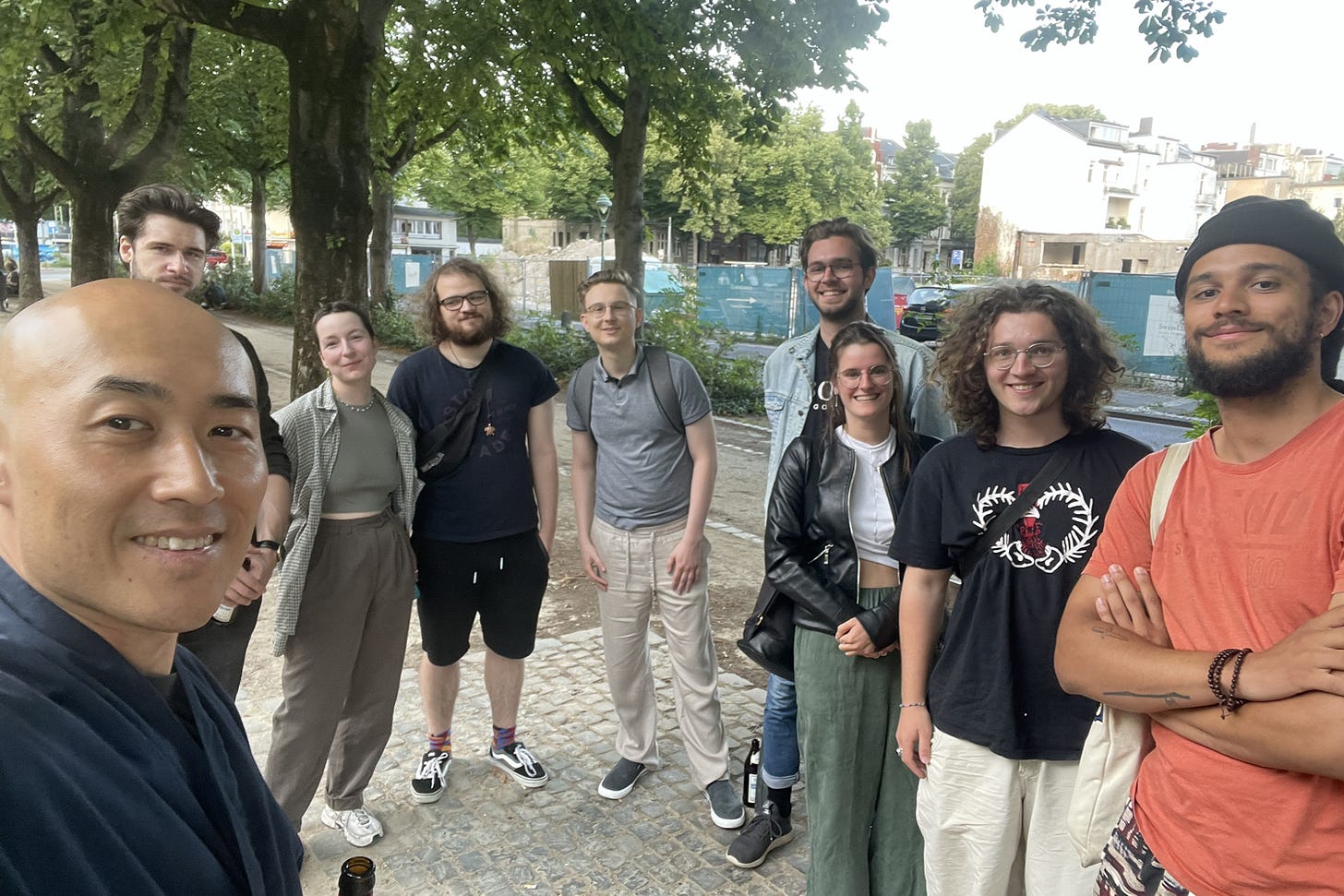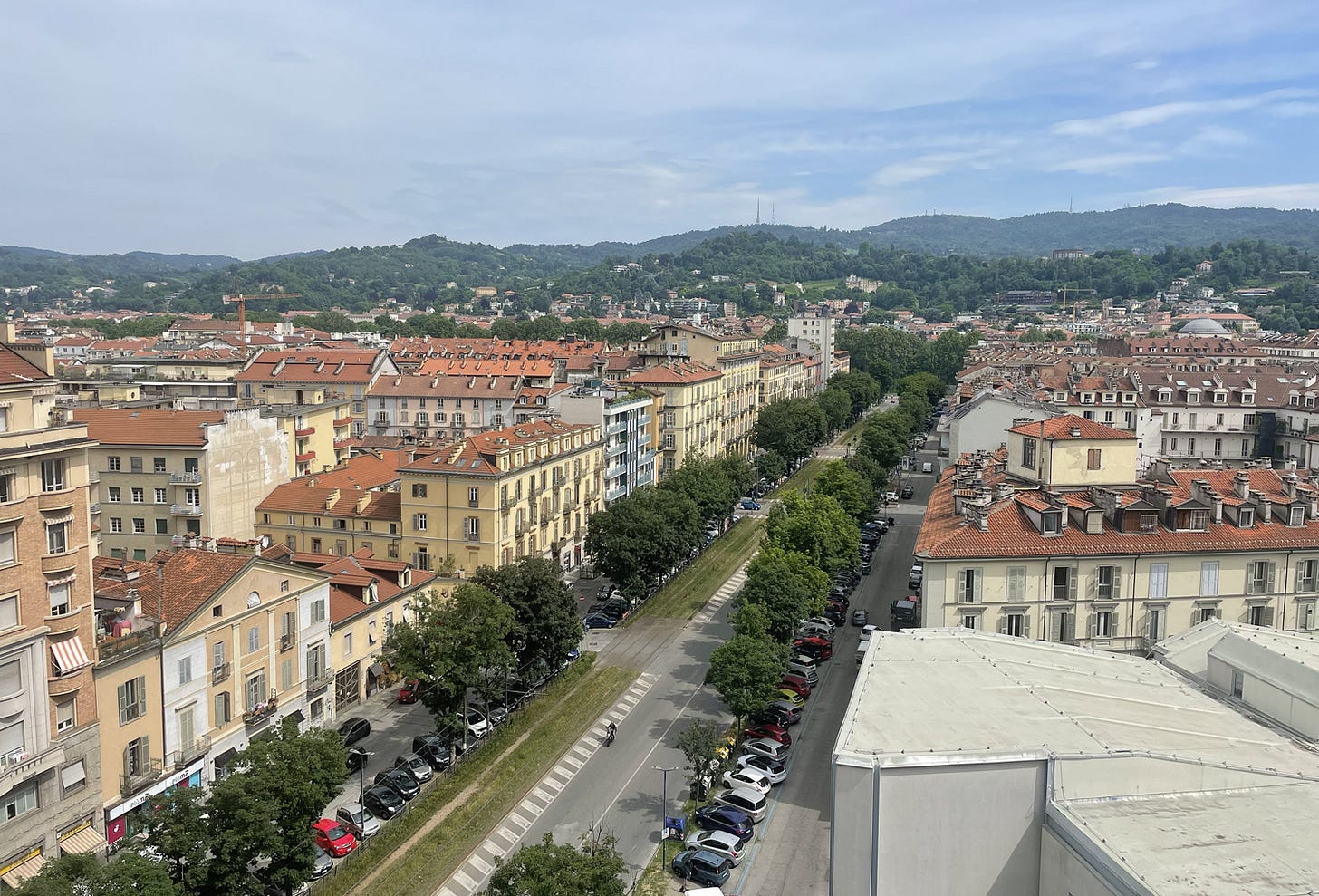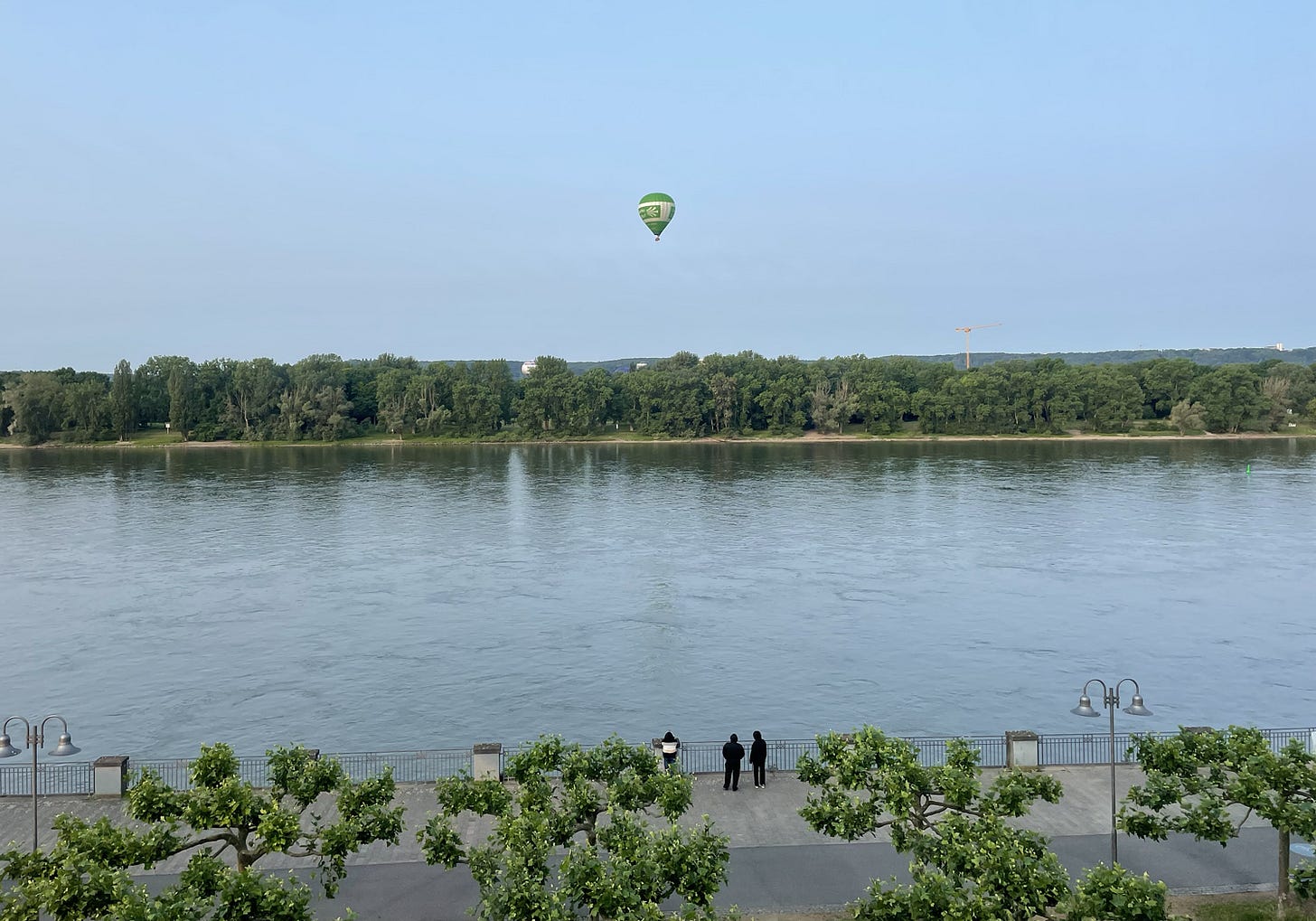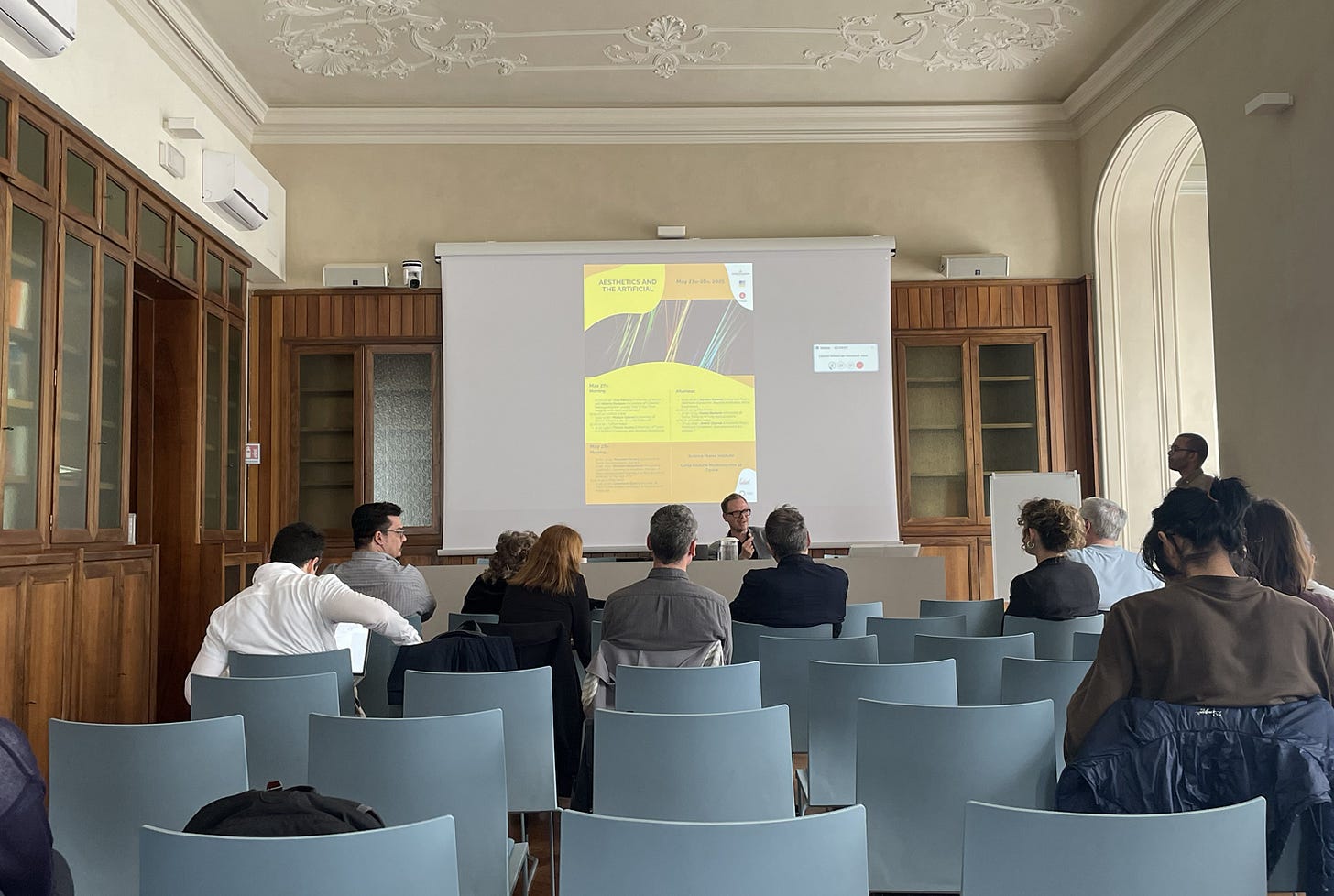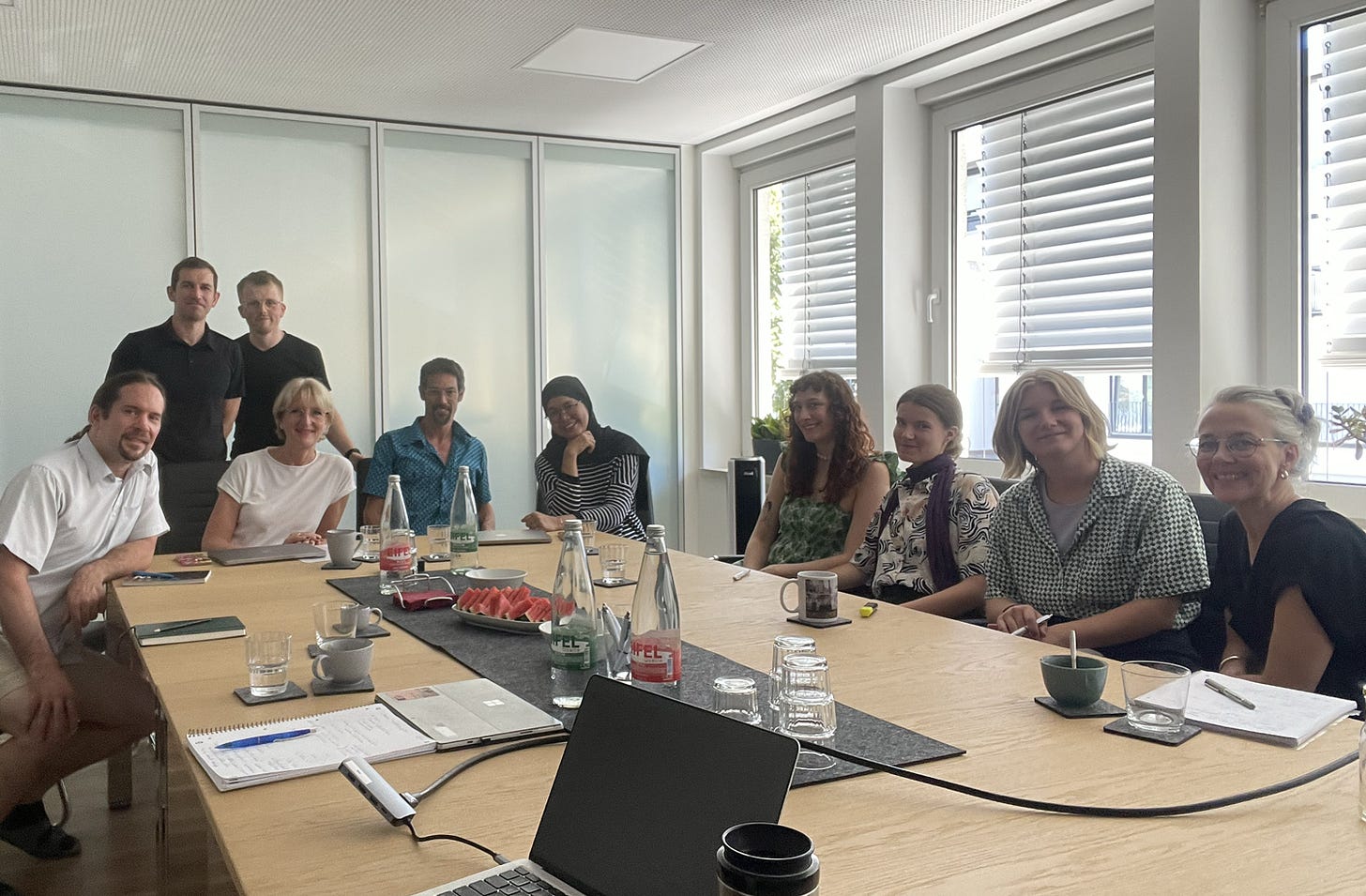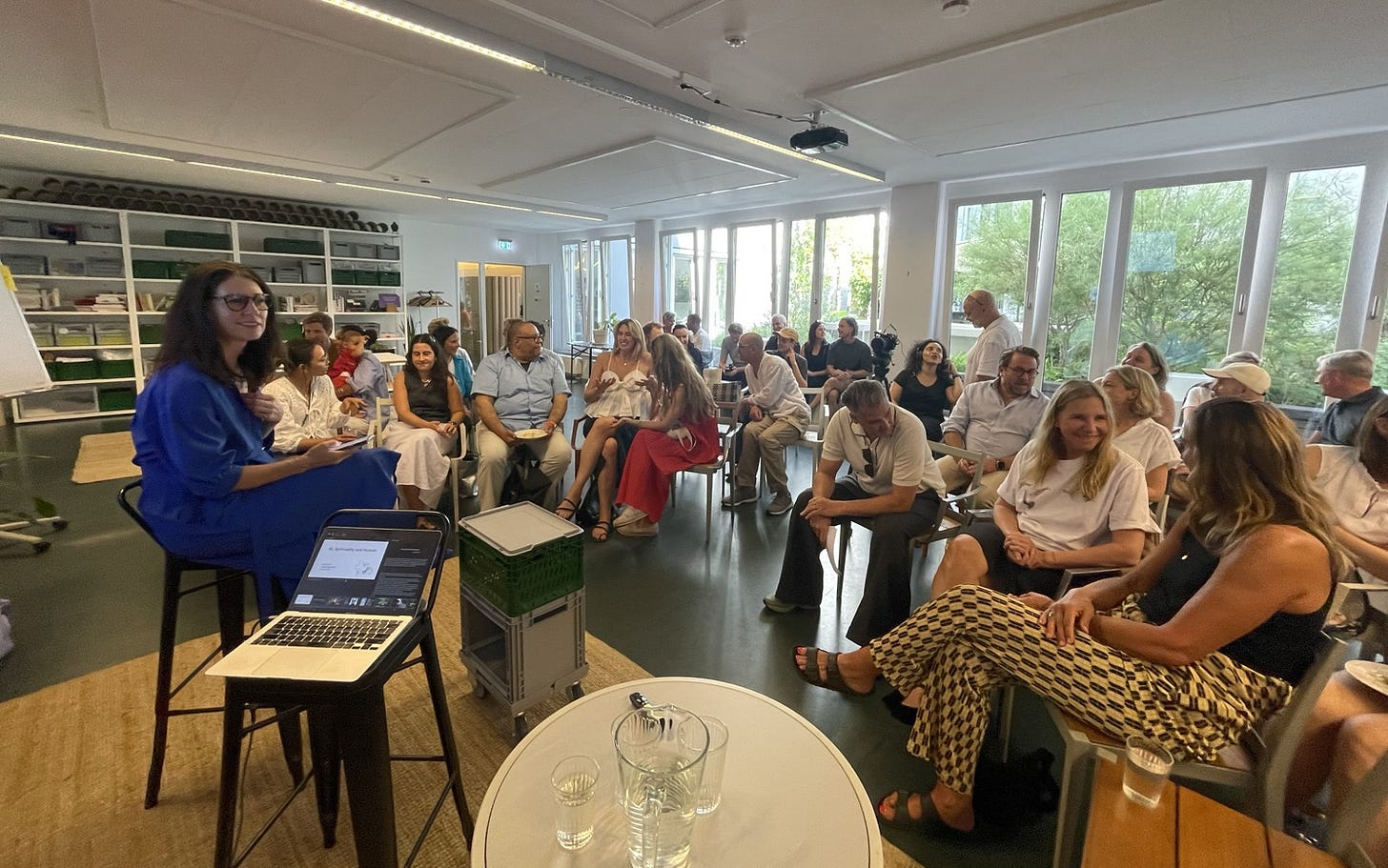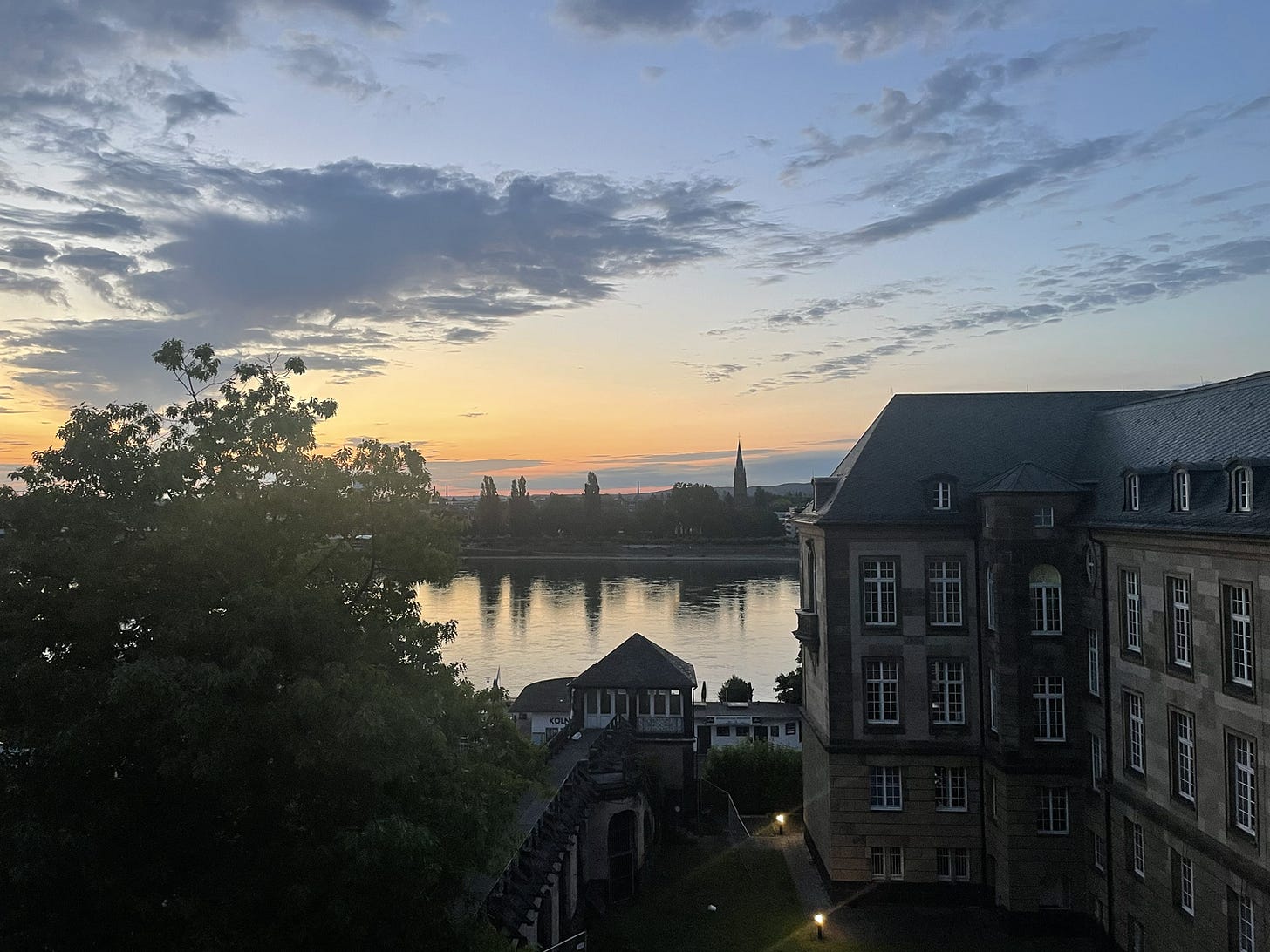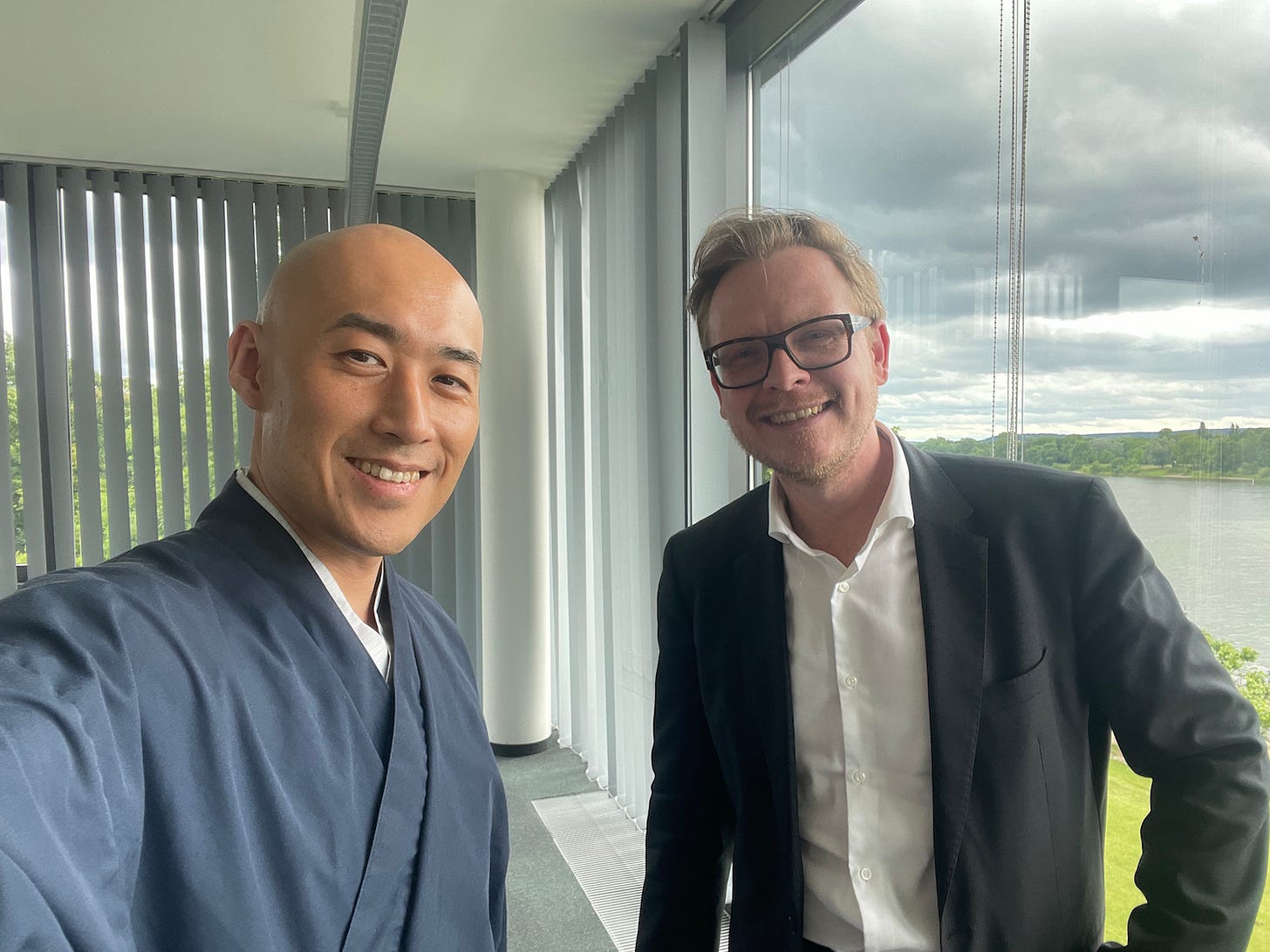Germany stay report 2025
Response to New realism
I first met Markus Gabriel last year at Tsukiji Hongwanji Temple, where we held a dialogue as part of Musashino University’s 100th anniversary Camphor Tree Village Project. Being of roughly the same generation, we became quite close. One fond memory is when we cleaned the cemetery at Komyoji Temple together as part of the event. It was during that time that I learned Markus’s father had worked as a cemetery gardener.
Later, through ongoing conversation, we realized that we would both happen to be in New York City around the same time a few months later. We agreed to meet there as well, and ended up visiting a filmmaker friend’s home together, further deepening our friendship. One key point of connection was our shared resonance with the concept of the “human-animal.” During a taxi ride back to my hotel from northern Manhattan, we talked about the possibility of conducting some kind of joint research on Buddhism and AI. Markus mentioned that his university had a visiting professor invitation program and said he would look into whether it might be used. That eventually became a reality.
▼ Lecture: Human Literacy in the Age of AI
https://www.cst.uni-bonn.de/en/events/human-literacy-in-the-age-of-ai
▼ Desirable Digitalisation: Rethinking AI for Just and Sustainable Futures
https://www.cst.uni-bonn.de/en/research/desirable_digitalisation
▼ Profile
https://www.cst.uni-bonn.de/en/persons/shoukei-matsumoto
During my one-month stay in June, I had no formal obligations, but I stayed in line with the purpose of the program introduced in the above links. The stay was supported by the Mercator Foundation, which I will discuss later. My personal research focus was on the theme of Human Literacy. (During my stay, my eldest son, a second-year high school student, temporarily joined me from Japan to study German.)
The philosophy groups of the University of Bonn (Germany), the University of Turin (Italy), and the Sorbonne University (France) have formed a collaborative relationship that could be described as a “New Realism” team. As part of their "Summer School" series, conferences were held across Europe during the summer. I was able to participate by timing my stay to begin in late May in Turin and conclude in early July in Paris.
Throughout the stay, I had the opportunity to engage in many discussions with contemporary European philosophers, which gave me much to reflect on. Unlike in the United States, it is taken for granted that European philosophers are multilingual. They switch languages effortlessly during presentations, which posed challenges for someone like me who only speaks English. Markus, for example, speaks multiple languages fluently—Italian to Italians, French to French, Portuguese to Portuguese—shifting languages mid-conversation, making it difficult to keep up. At conferences held in Germany or Italy, presentations were generally in English, which helped. However, in France, where the use of French is more dominant, more presenters opted to present in French. Markus kindly informed me in advance, “Tomorrow I’ll be presenting in French, so I’ll share the English version with you beforehand,” which allowed me to follow. Without such consideration, I would have had no choice but to rely on audio recording and live transcription and translation tools to grasp the content. Still, the fact that modern translation technology allows for a decent understanding in real time is quite remarkable.
So, what kinds of discussions took place? With Markus Gabriel at the center, the “New Realism” project brought together scholars such as Maurizio Ferraris (University of Turin) and Jocelyn Benoist (Sorbonne University), and we explored a wide range of topics, moving across ontology, epistemology, phenomenology, and etymology.
Here are some impressions and reflections.
My chosen research theme was “transcending human-centered perspectives.” Being familiar with Japanese Buddhism, I had assumed this wouldn’t be a particularly difficult theme to approach. However, I quickly realized that I had underestimated the deep and tenacious cultural commitment to “humanity worship” rooted in the Renaissance tradition of Europe. The modern history of Europe, which has led the world through a human-centered worldview, is not easily undone. Of course, themes such as decolonialism and post-anthropocentrism are also actively discussed in Europe, but whenever the topic of AI enters the conversation, the latent desire to assert human superiority over AI often resurfaces. My interest, however, lies in examining this very human impulse to humanize—to treat others as “fellow humans” and protect them. That is precisely why I have framed my theme as “Human Literacy.” Yet, in order to reach that level of discussion, I found that there were countless conceptual hurdles and unshared premises that had to be overcome.
The Western philosophical tradition is so well-established that one might say nearly everything conceivable by humans has already been thought through. Any new idea proposed will almost certainly resemble something someone has already explored, and one must begin by clarifying how it relates to or differs from that previous thought. The same can be said of Buddhism. While there has been some historical exchange between Western and Eastern thought, they have fundamentally developed as independent systems. As a result, both are now intellectually saturated.
It is precisely in this situation that the emergence of AI presents a new context. I sense that where Western philosophy, Eastern philosophy, and AI intersect, there may lie a breakthrough capable of surpassing the current impasse.
During my stay in Germany, I also had opportunities to interact with students at the University of Bonn. One particularly memorable moment involved a question about anti-natalism. After I introduced the concept of being a “Good Ancestor,” a student asked whether, if we assume a bleak future, perhaps choosing not to have children might be the most responsible way to become one. Another suggested that supporting anti-natalism by refraining from increasing the population and instead adopting children might be a better path. These were thought-provoking arguments, based on the idea of maximizing well-being for currently living individuals while considering humanity’s overall optimization. Such discussions are rare in Japan and reflected a strong regional perspective.
Another topic I introduced was the idea of AI functioning as a kind of Buddha—guiding sentient beings along the path of awakening. To explain this adequately, however, it is essential to communicate the foundational premises of Buddhism in considerable detail. This includes recounting the life of Shakyamuni Buddha and the development into Mahayana Buddhism, as well as discussing the historical transformations of the very concept of “Buddha.” I realized that I must develop the skill to distill and convey only the most essential elements of this story for a Western audience, without unnecessary elaboration.
One colleague at the University of Bonn remarked that, in Europe, the ideas of Marxist theory, Freudian psychoanalysis, and Nietzsche’s notion of the “death of God” may have fulfilled their historical roles, yet still cast long shadows over contemporary thought. Indeed, Marx is frequently referenced in discussions; the recurrence of “trauma” as a topic evokes Freud; and despite Christianity’s visible decline as an active religion in Europe, the idea of the death of God paradoxically continues to amplify His presence in absentia.
Post-colonialism, post-humanism, post-modernism—deconstruction has reached its limits, and there is a general awareness that something new must be built. Yet, there is also hesitation: no one wants to reconstruct in the same way as before. It felt to me that European intellectuals find themselves at this moment of pause. Meanwhile, social fragmentation continues to intensify, and everyone seems aware that we can no longer afford to remain idle.
A Journey through Three European Cities: New Realism, the Mercator Foundation, and The DO School in Berlin
This research trip to Europe centered around a one-month residency at the University of Bonn, but I also visited Turin, Italy, and Paris, France before and after my stay in Germany. Across these three cities, I participated in a series of interlinked study sessions hosted by philosophers, all connected by the concept of “New Realism.”
New Realism is a philosophical movement that seeks to reconstruct notions such as “reality” and “truth,” which were once deconstructed in the wake of the linguistic turn and postmodernism in the late 20th century. Its proponents aim to grapple with 21st-century challenges such as AI and the climate crisis. At the center of this movement is Markus Gabriel (University of Bonn), alongside Maurizio Ferraris (University of Turin) and Jocelyn Benoist (Sorbonne University), who each organize workshops and summer schools at their respective institutions in a loosely coordinated manner.
University of Turin: Between Beauty and AI
My journey began at the Scienza Nuova Institute at the University of Turin, where I joined the workshop “Aesthetics and the Artificial.” The central theme was how the emergence of AI is transforming traditional aesthetic categories such as beauty and nature. Can creativity and artistic evaluation be expanded by AI, or are they being replaced altogether? The workshop explored the philosophical implications at the intersection of aesthetics and technology, especially in relation to humanity’s fundamental experience of nature and art.
As expected from a country so closely tied to the Renaissance, Italy showed the strongest tendency toward celebrating humanity. I sensed an undercurrent of trying to discover something only humans—never machines—could do. Personally, I have already accepted the future of AI-human coexistence as inevitable, but here, I felt more resistance to that idea than elsewhere.
University of Bonn: Philosophical Inquiry into the Self
The next program was the “Contemporary Philosophy Summer School” held at the University of Bonn, where I was based for most of the month. This year’s theme was “Problems of the Self.” Leading contemporary philosophers—Markus Gabriel, Lucy O’Brien (University College London), and François Recanati (Collège de France)—explored a wide range of topics, including self-consciousness, self-reference, transparency, social construction of the self, and personal identity. Matthew Boyle (University of Chicago) introduced the intriguing concept of “armchair philosophy.”
Many of the discussions were framed through linguistic analysis, with a heavy focus on European languages. For instance, debates about the subject implied by “I” often presupposed grammatical and philosophical structures rooted in Indo-European languages. As a native speaker of Japanese—a language in which the grammatical subject is often implicit—I repeatedly encountered fundamental differences in starting assumptions. While this linguistic uniqueness may be a disadvantage when seeking shared terminology, it also offers an advantage in bringing fresh perspectives into philosophical discourse.
Sorbonne University: Rethinking Nature, Earth, World, and Environment
The final stop was a workshop at the Sorbonne University in Paris, titled “Realism as a Response to the Challenges of our Time.” The event focused on four core concepts—“Environment,” “Earth,” “World,” and “Nature”—to explore how philosophy can respond to today’s environmental crises.
Using Markus Gabriel’s provocative thesis that “the world doesn’t exist” as a starting point, participants examined connections between contemporary environmental thought and philosophy. Topics included “terrestrial philosophy,” political ecology, and mesology (a form of regional environmental philosophy). The discussion dove deeply into whether nature should be understood as “existence” or “relationality”—a question that lies at the heart of philosophical inquiry, particularly within the European tradition.
I found the framing of the question—“What words might we use in place of ‘the world’?”—to be quite fascinating. Terms like “the terrestrial” and “Gaia” were proposed as alternatives, and there was active discussion around overcoming the limitations of the word “world.” At the same time, I also sensed a subtle self-awareness among the participants that, even as such debates unfolded, the climate crisis continued to worsen in the background—highlighting the dissonance between philosophical analysis and urgent real-world issues.
Lecture at the Mercator Foundation: Philosophy and Social Practice
While based in Bonn, I made a short trip to Essen in North Rhine-Westphalia to give a lecture and engage in dialogue at the Mercator Foundation.
The Mercator Foundation is one of Germany’s leading philanthropic foundations, named after the 16th-century geographer Gerardus Mercator. Just as Mercator sought to expand the map of human knowledge, the foundation supports initiatives across education, culture, climate change, and equitable digital societies. My visiting professorship at the University of Bonn was made possible through the Mercator Fellowship.
During the visit, I had a small-group lunch session with the foundation’s leadership, including Wolfgang Rohe (Executive Director) and Carla Hustedt (Director of the Centre for Digital Society). We discussed themes of spirituality and ethical attitudes in contemporary society, taking my books A Monk’s Guide to a Clean House and Mind and A Quiet Mind as a starting point.
Later in the afternoon, we held a public dialogue session for the foundation’s staff. The conversation revolved around how individuals can maintain ethical foundations in the face of AI, social division, and the climate crisis. I contributed from a Buddhist perspective, and the concept of “Human Literacy” seemed to resonate strongly with the audience.
Lecture in Berlin: On Humanity and Spirituality in the Age of AI
In mid-June, between sessions in Bonn, I visited The DO School in Berlin to deliver a public lecture and engage in dialogue with local citizens, philosophers, businesspeople, and policymakers. The event came together through an invitation from Lisa Witter, who had participated in the Learning Module for Young Global Leaders I hosted in Japan earlier in the year, and Florian Hoffmann, founder of The DO School, whom I also met in Japan.
The theme of the event was fundamental: What does it mean to be human in the age of AI? And what does leadership look like in that context? With the rise of AI, growing automation, and the emergence of transhumanist thinking, we are now called to reconsider the nature of human spirituality, ethics, decision-making, and even existence itself.
In my talk, I presented the idea that “AI is egoless—it functions as a mirror, reflecting our consciousness, values, and worldview.” Rather than viewing AI as friend or foe, the key question becomes: How do we use this mirror to reflect inwardly and deepen our awareness? This lies at the heart of what I call Human Literacy.
I also discussed how the future of technology varies dramatically depending on cultural perspective. To borrow Markus Gabriel’s framing: the U.S. aims to win the AI arms race; Europe seeks to regulate the threat; and Japan leans toward coexistence. Underlying Japan’s approach is an animistic worldview, where all things are seen as possessing spirit, and a Buddhist philosophy of relational interdependence (engi). Framing the human–AI relationship not in terms of control but of mutual presence offers a unique and potentially valuable perspective to global discourse.
During the Q&A, many deep questions emerged: How will human leadership coexist with AI decision-making? Can only humans possess a soul, or might AI also come to embody a form of spiritual presence? One particularly striking moment came when the moderator asked: If faced with a life-changing decision, would you consult the world’s most advanced AI, or a monk in a mountain temple? Most of the audience raised their hands for the monk, indicating an enduring intuitive trust in human wisdom. (I nearly raised mine for the AI—laughs.)
This dialogue in Berlin, spanning themes of AI, spirituality, ethics, and leadership, offered a valuable opportunity to revisit the question of what it means to be human. Ultimately, the trajectory of future technologies depends on how we shape ourselves. Rather than fearing AI, we must reflect on what it reveals about our unconscious drives and ethical frameworks—and engage with them sincerely.


